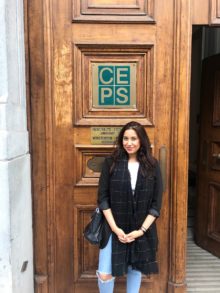I started my summer internship in April 2019 as part of my Masters at the Centre for European, Russian and Eurasian Studies at the Centre for European Policy Studies (CEPS) in Brussels, Belgium. It was by chance that I met my current supervisor, Steven Blockmans, at an international summer school in Pisa last June. As the Head of EU Foreign Policy at CEPS, he presented his book “The Obsolescence of the European Neighbourhood Policy” and I was immediately interested in pursuing more research on the topic. Come fall of 2018, I reached out to Steven, applied to be a research intern, and to my delight secured the summer position.
Working at CEPS in the Europe in the World unit has been one of the most rewarding endeavors of my academic and professional career. CEPS is the premier think tank in Europe for EU affairs in policy areas including economy and finance, the digital economy, energy and climate, education and innovation, foreign policy, EU integration, and justice and home affairs. While an independent think tank, CEPS attracts grants and produces policy research for the European Commission, the European Parliament, national governments, and private organizations. Its headquarters are in Brussels so as to have proximity to EU agencies, but researchers often travel all over the world to engage with stakeholders.
In my capacity as Research Intern I independently and collaboratively compile state-of-the-art secondary and primary research to be made into policy briefs, reports, and commentaries in preparation for publication on the CEPS website. To that end, I have been fortunate enough to be able to attend topical conferences, forums, seminars, and high-level EU events, and constantly network with other policy think tanks, civil society organizations, and high-level EU delegates—indeed, Brussels is the ideal place for this. Most importantly, Steven helps me streamline available events to suit my personal research interests so as to gain maximum exposure.
My assigned area of expertise is the Eastern Partnership vis-à-vis the European Neighbourhood Policy. As a part of this, I attended the High-Level Conference on the 10th Anniversary of the Eastern Partnership at the European Commission on May 14 with a cohort of star-‘striking’ speakers such as President of the European Commission Jean-Claude Juncker, European Commissioner for Neighbourhood and Enlargement Negotiations Johannes Hahn, High Representative for Foreign Affairs and Security Policy and Vice-President of the European Commission Federica Mogherini, and several heads of state from Ukraine, Azerbaijan, Moldova, Armenia, Georgia, and Belarus. My brief for the Swedish International Development Agency (SIDA) was published on the 3DCFTA News section. I’ve also had the opportunity to attend and participate in Eastern Partnership Civil Society Forums at the Permanent Representative of the Czech Republic to the EU, and upcoming, at the Permanent Representative of Finland to the EU, among several other delegation-organized events.
The shift from writing as an academic producing lengthy, technical papers to writing in a quick, thoughtful, and informed manner for the consumption of policymakers and other important stakeholders has been the most challenging. Fortunately, I have ample opportunity to develop this skill and several reputed Research Fellows to help me with the process—a personal favourite anecdote is reviewing and offering advice on a report on South Ossetia written by famed journalist and writer specializing on Eastern Europe and the Caucasus, Thomas (Tom) de Waal. My main end-of-internship deliverable will be a CEPS-style commentary on the EU’s 2019 Central Asia Strategy to be published on their website. Presently, however, I am assisting a host of researchers in my department with their personal projects in order to broaden my horizons and hone transferable research skills. In that way, CEPS has allowed me to truly get out of my comfort zone and try my hand at uncharted topics such as risk, resilience, and malign influence in the Caucasus and Western Balkans, and EU-India diplomatic and diasporic relations.
Last but not least, the calibre of interns I work with has been as motivating as the environment of Brussels itself. It is apparent, however, how well my education at the University of Toronto (both undergraduate and graduate level) prepared me for this internship in terms of writing, reading, researching skills, professionalism, and cross-cultural communication. Often I am reminded of my privilege in being able to study at the University of Toronto and to bring its lessons and experiences with me as I travel, intern, research, and volunteer abroad. This time, however, I am looking forward to bringing a host of new experiences from CEPS back with me to UofT for the second year of my Masters at CERES.
News from the region: Mridvika Sahajpal, MA CERES Candidate (2020), on her internship in Brussels
